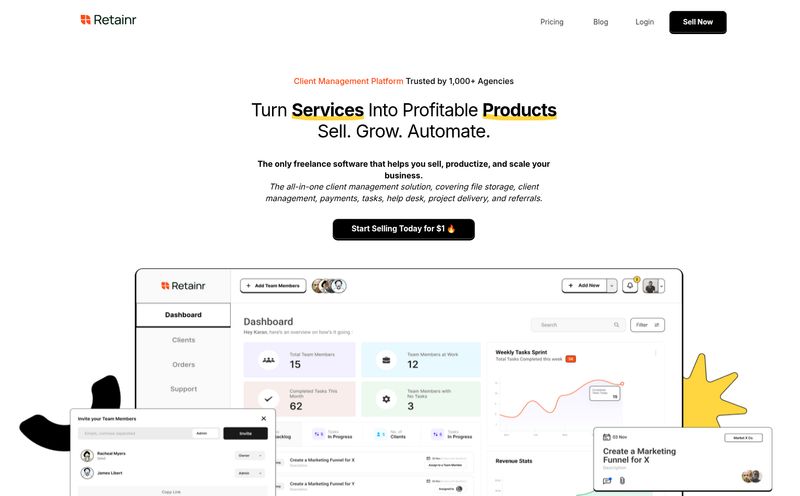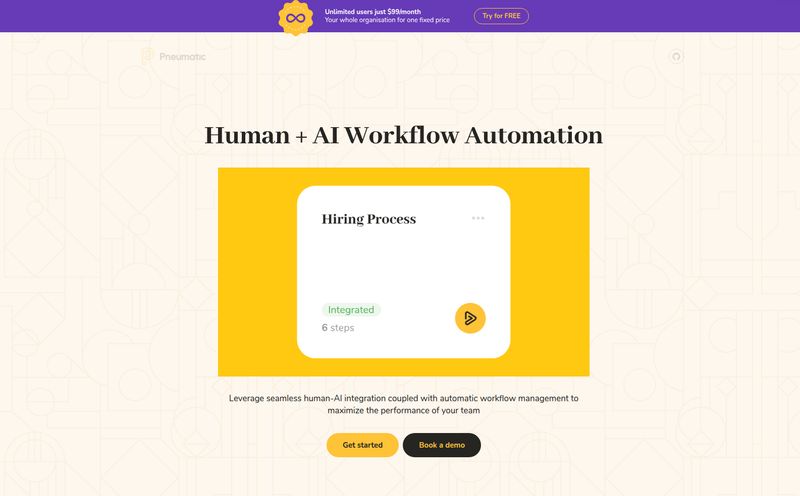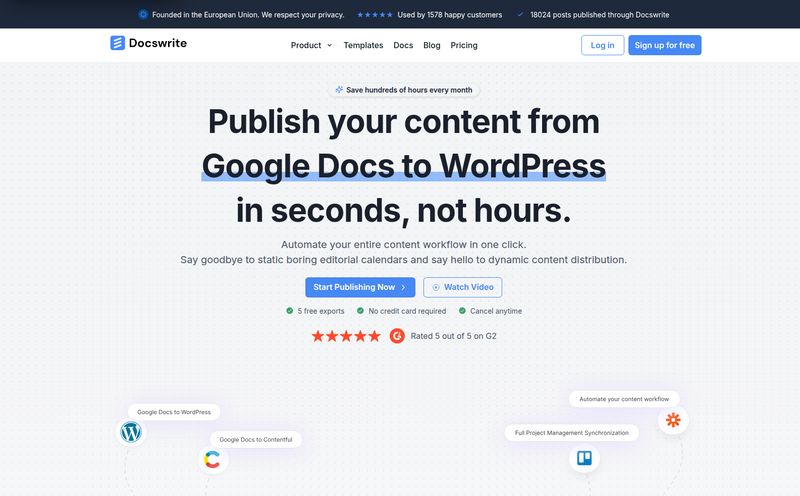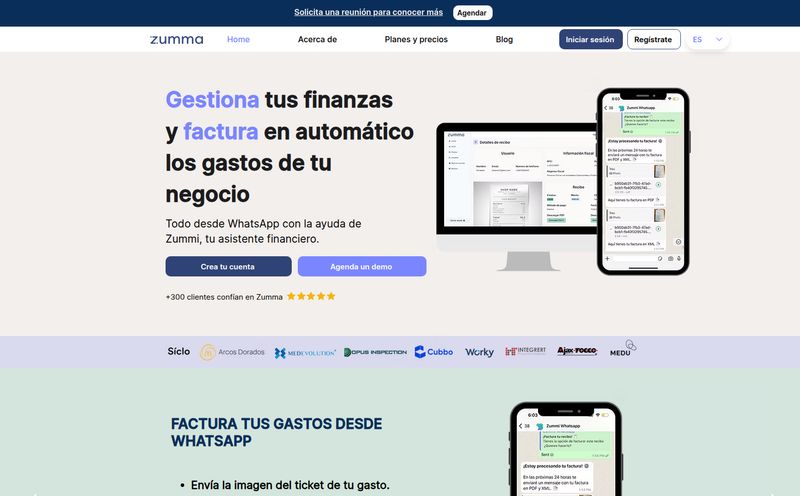If you’ve ever been deep in the trenches of pre-production, you know the feeling. The script is locked (mostly), the excitement is buzzing, but then comes the… paperwork. Endless spreadsheets, highlighter fumes that could knock out a rhino, and that nagging fear that you’ve missed one tiny detail in the script breakdown that’ll cost you thousands on shoot day. I’ve been there. My desk has looked like a beautiful mind conspiracy board, connecting character scenes to props to locations.
It's organized chaos, but it’s still chaos. So when the wave of AI tools started crashing into every industry, I kept a curious, albeit skeptical, eye on filmmaking. Can a robot really understand the nuance of a screenplay? Is it here to take jobs or just make the mountain of pre-produciton work a little less… mountainous? After hearing some chatter, I decided to take a look at a platform called RivetAI. And honestly, I’m intrigued.
What Exactly Is RivetAI?
So, what's the deal with RivetAI? In simple terms, it's an AI-powered platform designed to be your pre-production sidekick. It takes your script and, like a hyper-efficient PA who's mainlined coffee and has perfect recall, it automatically breaks it down. We're talking about tagging every single element—characters, props, locations, sound effects, you name it—and organizing it into something you can actually work with.
Think of it less as a replacement for your producer and more as a force multiplier. It handles the most tedious, time-sucking parts of prep, freeing up the human brains in the room to focus on what actually matters: making creative decisions and, you know, making a great film.
The Features That Actually Matter
A feature list is just a list until you see how it actually helps. Some of RivetAI's promises are pretty bold, so let's get into the ones that caught my eye.
The Magic of Automated Script Breakdowns
This is the big one. Manually breaking down a 110-page script is a rite of passage, but it’s also prone to human error. I once missed tagging a specific prop car for a scene, which led to a very stressful morning of phone calls. Fun times. RivetAI aims to make that a thing of the past. You upload your script, and the AI combs through it, identifying and categorizing all the elements. It generates reports that give you an at-a-glance overview of everything you’ll need to beg, borrow, or buy.
It also provides instant character insights, showing you which scenes they're in, their speaking time, and their interactions. This is incredibly useful not just for scheduling actors but for the ADs and department heads to get a quick handle on the script’s demands.
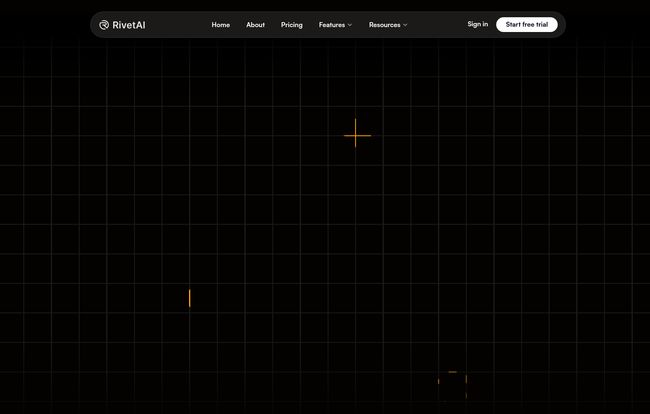
Visit RivetAI
It's about turning that dense block of text into actionable data. And doing it in minutes, not days.
From Breakdown to Shooting Schedule in a Click?
Okay, this is where my skepticism really kicked in. Automatic shooting schedule generation? A shooting schedule is a complex beast, balancing actor availability, location permits, daylight hours, and a dozen other variables. The idea that an AI can just spit one out seems a little far-fetched. RivetAI connects its script breakdown directly to a scheduling tool, proposing a schedule based on scene requirements. In my experience, it's a fantastic starting point. It's not going to know that your lead actor has a hard out at 4 PM on Tuesdays, but it does the initial heavy lifting of grouping scenes by location or cast. You still need a human—a line producer or a 1st AD—to refine it, but it gives them a hell of a head start.
Talking Budgets Without Breaking a Sweat
Once you have a breakdown, you can start to see the money. RivetAI helps with this by providing what it calls 'precision budget control.' By having every single element tagged and accounted for, you can generate more accurate initial budget estimates. You can see right away if you have 57 unique locations or if your hero character has 15 different wardrobe changes. It’s an early warning system that helps you make smarter creative choices before they become expensive problems on set.
Security and Collaboration Are Not Afterthoughts
This part genuinely impressed me. In an age of leaks and IP theft, script security is a major concern. The team at RivetAI seems to get this. They talk a big game about uncompromising script security, using enterprise-grade encryption and, importantly, stating they have a zero-sharing policy with external AI models. That means your brilliant, top-secret screenplay isn't being used to train some other company's large language model. Phew.
They also offer granular access controls, letting you decide exactly who on your team sees what. Your costume designer probably doesn't need access to the VFX budget breakdown, and RivetAI makes it easy to manage those permissions. It’s a professional-grade feature that shows they're thinking about how real production teams work.
The Real-World Test: What Are Producers Saying?
I’m just one guy with an opinion, so I always like to see what other industry folks are saying. The testimonials on their site are pretty telling. Michael Husband, the CEO of Desert Pirate Productions, said something that really hit home:
"RivetAI is a remarkable tool for film producers, offering a realistic approach by not pretending to be perfect or replace a line producer entirely. [...] It doesn't replace the human element but supports it..."
That nails it. This isn't about firing your team. It's about empowering them. Elvira Casper, a screenwriter, mentioned how it streamlined her process, while script editor Herbert Metz called it an "invaluable tool" for refining scripts. The consensus seems to be that it's a powerful assistant, not an autonomous director.
Let's Talk Money: RivetAI Pricing Breakdown
So, what’s the damage? The pricing structure seems pretty well thought out for different kinds of creators. Here's how it shakes out:
| Plan | Price | Best For |
|---|---|---|
| Free | $0 | A quick test drive. You get one project for 7 days to get a feel for the platform. It's a great way to see if it fits your workflow without any commitment. |
| Indie | $150 / project | This feels like the sweet spot for most independent filmmakers. You get the full AI report, unlimited interactions, and you can export your data to other programs like Movie Magic Scheduling. |
| Studio | Custom | The big leagues. This is for studios with multiple projects and unique workflows. It comes with unlimited user access and credit-based usage, so you'd schedule a call with them to sort out a package. |
The Honest Truth: The Good, The Bad, and The AI
No tool is perfect. After poking around and weighing the features, here's my honest take.
What I love: The sheer amount of time this thing can save is staggering. The manual drudgery of breaking down a script is where creativity goes to die, and automating that is a huge win. The security features are also a major plus, showing a real understanding of the industry's needs. It’s a fantastic organizational brain that keeps everything in one place.
Where it could improve: Let's be crystal clear, and the tool's own proponents agree: this is not a replacement for a line producer. The AI is smart, but it lacks human context and experience. You will still need to manually review and edit its output. The schedule it generates won't be perfect out of the box. For larger teams on the Studio plan, the "credit-based usage" model might require careful management to avoid unexpected costs. It’s a tool to be wielded by a professional, not a magic button to do their job for them.
My Final Verdict: Should You Use RivetAI?
So, what's the bottom line? If you're an independent filmmaker, a producer, or a 1st AD who feels like you're drowning in spreadsheets, I think RivetAI is absolutely worth a look. The Indie plan's price of $150 for a single project could easily pay for itself in the hours you save—and the costly mistakes you avoid. It streamlines the grunt work so you can focus on the creative leadership your project deserves.
It's an incredibly powerful assistant. It takes the most repetitive, error-prone tasks of pre-production and puts them on autopilot. The future of filmmaking isn't about AI taking over; it's about smart collaboration between human creativity and machine efficiency. And from what I've seen, RivetAI is a significant step in that direction.
Frequently Asked Questions about RivetAI
- Is RivetAI difficult to learn?
- From my exploration, the interface is quite intuitive. If you're familiar with standard film production software and documents, you should be able to get the hang of it pretty quickly. The Free plan is a great way to find out for yourself.
- Can RivetAI replace my line producer or 1st AD?
- Absolutely not. It's a tool designed to support them, not replace them. It automates tedious tasks, but it lacks the real-world experience, problem-solving skills, and contextual understanding of a seasoned professional. Think of it as an assistant, not a department head.
- How secure is my script on RivetAI?
- They emphasize security heavily. RivetAI uses enterprise-grade encryption and has a strict policy of not sharing your script data with any external AI models. For filmmakers concerned about intellectual property, this is a key feature.
- What file formats can I export?
- The Indie and Studio plans allow you to export your data in various industry-standard formats, including FDX, CSV, PDF, and XLSX. This makes it easy to integrate the information into your existing workflow.
- Does RivetAI work with other software?
- Yes, a significant feature is the ability to export to Movie Magic Scheduling, which is a standard in the industry. This interoperability is crucial for professional workflows.
Reference and Sources
- RivetAI Official Website
- RivetAI Pricing Information
- Forbes - AI is Coming for Hollywood, But It's Not an Apocalypse
